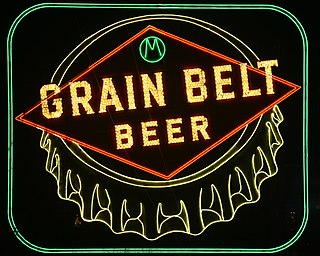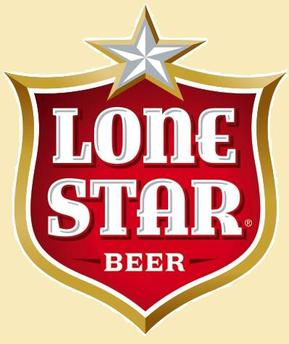
The Joseph Schlitz Brewing Company was an American brewery based in Milwaukee, Wisconsin, and was once the largest producer of beer in the United States. Its namesake beer, Schlitz, was known as "The beer that made Milwaukee famous" and was advertised with the slogan "When you're out of Schlitz, you're out of beer". Schlitz first became the largest beer producer in the US in 1902 and enjoyed that status at several points during the first half of the 20th century, exchanging the title with Anheuser-Busch multiple times during the 1950s.

Sleeman Breweries is a Japanese-owned Canadian brewery founded by John Warren Sleeman in 1988 in Guelph, Ontario. The company is the third-largest brewing company in Canada. Along with its own Sleeman brands, the company produces under licence the Stroh's family of brands, Maclays Ale and Sapporo Premium beers for sale in Canada. The company's parent Sapporo owns 4.2 per cent of Ontario's primary beer retailer The Beer Store.

The Theodore Hamm's Brewing Company was an American brewing company established in 1865 in Saint Paul, Minnesota. Becoming the fifth largest brewery in the United States, Hamm's expanded with additional breweries that were acquired in other cities, including San Francisco, Los Angeles, Houston, and Baltimore.
The Stroh Brewery Company was a beer brewery in Detroit, Michigan. In addition to its own Stroh's brand, the company produced or bought the rights to several other brands including Goebel, Schaefer, Schlitz, Augsburger, Erlanger, Old Style, Lone Star, Old Milwaukee, Red River, and Signature, as well as manufacturing Stroh's Ice Cream. The company was taken over and broken up in 2000, but some of its brands continued to be made by the new owners. The Stroh's brand is currently owned and marketed by Pabst Brewing Company, except in Canada where the Stroh brands are owned by Sleeman Breweries.

The Pabst Brewing Company is an American company that dates its origins to a brewing company founded in 1844 by Jacob Best and was, by 1889, named after Frederick Pabst. It is currently a holding company which contracts the brewing of over two dozen brands of beer and malt liquor: these include its own flagship Pabst Blue Ribbon, as well as brands from (now-defunct) breweries, including:

Olde English 800 is a brand of American malt liquor brewed by the Miller Brewing Company. It was introduced in 1964, and has been produced by the company since 1999. It is available in a variety of serving sizes including, since the late 1980s, a 40-U.S.-fluid-ounce (1,200-milliliter) bottle.

Grain Belt is a brand of beer brewed in the American state of Minnesota, by the August Schell Brewing Company. The beer has been produced in a number of varieties. Grain Belt Golden was the original style introduced in 1893. The current offerings are: Grain Belt Premium, first introduced in 1947; Grain Belt Premium Light; Grain Belt Nordeast, introduced on April 7, 2010; and the newest offering, Grain Belt Lock & Dam, introduced in 2016. It was originally produced by the Minneapolis Brewing Company which formed with the merger of four smaller brewers in 1891. Soon after introduction, Grain Belt became the company's flagship product. It was brewed at the original Grain Belt brewery in Minneapolis, Minnesota until 1976. A series of other owners followed, and Schell took over the product line in 2002.

The Olympia Brewing Company was a brewery in the northwest United States, located in Tumwater, Washington, near Olympia. Founded in 1896 by Leopold Friederich Schmidt, it was bought by G. Heileman Brewing Company in 1983. Through a series of consolidations, it was acquired by Pabst Brewing Company in 1999; the Tumwater brewery was closed in 2003.

The G. Heileman Brewing Company of La Crosse, Wisconsin, United States, was a brewer that operated from 1858 to 1996. It was ultimately acquired by Stroh's. From 1872 until its acquisition, the brewery bore the family name of its co-founder and brewer Gottlieb Heileman.

The Valentin Blatz Brewing Company was an American brewery based in Milwaukee, Wisconsin. It produced Blatz Beer from 1851 until 1959, when the label was sold to Pabst Brewing Company.

Brewers Hill is a neighborhood in the Southeast District of Baltimore, Maryland, United States.
Hudepohl Brewing Company is a brewery established in Cincinnati, Ohio in 1885 by founder Ludwig Hudepohl II. Hudepohl was the son of Ludwig Hudepohl who emigrated from Malgarten, Kingdom of Hannover, in 1838. Ludwig II had worked in the surgical tool business before starting his brewery. Hudepohl combined with Schoenling Brewing Company in 1986. Today, the Hudepohl-Schoenling Brewing Company is a wholly owned subsidiary of Christian Moerlein Brewing Company.
Goebel Brewing Company was a brewing company in Detroit, Michigan from 1873 to 1964, eventually acquired by Stroh Brewery Company.

The National Brewing Company was an American brewing company that was founded in Baltimore, Maryland, in 1885. Its Baltimore brewery was located in the city's Highlandtown neighborhood. After World War II, it grew to be the largest brewer in Baltimore history and its advertising, including one-eyed mascot "Mr. Boh" and its slogan "From the Land of Pleasant Living", became part of the folk culture of the Baltimore area.

Johann Gottlieb Heileman was the founder of the G. Heileman Brewing Company in La Crosse, Wisconsin. Heileman founded the brewery in 1858. His business strategy focused on producing the best local beer, rather than expanding nationwide like his company's contemporary Anheuser-Busch.

Primo Brewing Company is a Honolulu-based beer brewing company. The company claims the title "Hawai’i’s original beer". The brand is currently owned and operated by Pabst Brewing Company.

The Lone Star Brewery, built in 1884, was the first large mechanized brewery in Texas. Adolphus Busch, of Anheuser-Busch, founded it along with a group of San Antonio businessmen. The castle-like building which was once its brewery now houses the San Antonio Museum of Art. Lone Star beer was the company's main brand. The beer is still marketed as "The National Beer of Texas." The Lone Star name is now owned by Pabst Brewing Company. Production of Lone Star is currently contracted out to Miller Brewing Company in Fort Worth. The Lone Star name is used in the Philippines under license to Asia Brewery for a brand of light beer.

The Christian Schmidt Brewing Company was an American brewing company headquartered in Philadelphia, Pennsylvania. Founded in 1860, it was the largest brewing company in the history of Philadelphia, producing nearly 4,000,000 barrels of beer a year in the late 1970s. When it closed in 1987, it marked the first time in over 300 years that there was no brewery operating in Philadelphia.

Peabody Heights Brewery is a craft brewery located in the Abell neighborhood of Baltimore. It was founded in 2012 and is located on the site of Oriole Park V, also known as Terrapin Park. The 50,000 square feet (4,600 m2) facility was previously used as the bottling plant of Capital Beverage until around 2010. Peabody Heights Brewery was the first large scale brewery to open in Baltimore in 35 years. It operates as a co-op brewery, brewing and distributing beer for local craft breweries. In 2015, Old Oriole Park Bohemian won Best in Show in the Maryland Craft Beer Competition.

Milwaukee, Wisconsin, has one major brewery and dozens of microbreweries, and is home to several iconic beer brands from a variety of brewers. It has had an association with beer throughout its history, with the brewing industry getting its start prior to its official founding as a city and was nationally recognized as such by the end of the 19th century. This heritage can be found explicitly in its Major League Baseball team, the Milwaukee Brewers, and on recognizable beer brands such as Old Milwaukee and Milwaukee's Best. This recognition of Milwaukee as a brewing hub dates back to the early 20th century, and boasted the world's largest brewing capacity as late as 1981. The city is nationally recognized with the nickname "Brew City" due to its nearly two centuries of brewing heritage from multiple past major brewers including Miller Brewing Company, Pabst Brewing Company, and Joseph Schlitz Brewing Company. Today, through the ownership of MillerCoors, the city's largest brewery produces 10 million barrels of beer annually.



















